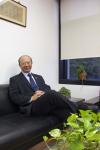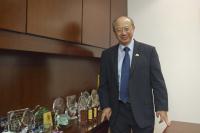Professor Michael Hui King-man, Chairman of the Committee, pointed out that teaching departments and administrative units in the university have gone through changes for twenty to thirty years, in terms of organizational structure or division of labour administratively. These changes will make an impact on the work habits and culture of CU staff members. In the face of change, differences in reaction and adaptive ability bring about divergence in the way colleagues handle situations or even in their value judgment.
Professor Hui admitted that he had noticed the trend of intensifying conflicts between colleagues. He believed that personnel disputes will affect the operational efficiency of an organization while reducing job satisfaction. Being unhappy at work is even becoming one of the main reasons why colleagues leave their job. He emphasized, "The University is committed to supporting to staff members in need, to help them find a solution so that their work and even their personal health and emotions will not be affected."
Prevention is better than cure
Disputes often stem from subtleties, which if handled inappropriately, a minor problem will suffer from a snowball effect. Professor Hui said with a smile on his face: "We cannot wait to take action until problems appear. Something has to be done beforehand in an effort to reduce the likelihood of problems occurring."
The very first target of the Committee is to organize training activities in staff awareness and understanding of human issues that often occur in the workplace. This will prepare them psychologically for facing various human issues or conflicts between staff members. They will come to understand that these problems and conflicts, in fact, are often the norm in the daily operation within an office. Apart from this, we provide popular training courses for new recruits on a regular basis to inform them of certain channels through which they can seek help in case of unfair treatment in the workplace. As for unit heads, we will provide them with custom-made professional training courses which include understanding the mentality of clerical and junior staff, maintaining good communication with these members and mastering mediation and negotiation skills. For supervisors, courses will be provided on coping with stress and emotions.
Outside mechanisms for dealing with complaints
CUHK has been equipped with formal mechanism to arbitrate in employee complaint cases. The current "Ad Hoc Panel" will be formed by the supervisor of the employee concerned (i.e. the Responsible Authority), one staff member appointed by the supervisor of the Responsible Authority, and one staff member from a standing list of potential members maintained by the Personnel Office, to be assigned on a roster basis on the principle that the person should not be from the Department/School/Unit with which the complainant or complainee is affiliated. Professor Hui likened the operation of the "Ad Hoc Panel" to that of a formal hearing: "the complainant" will give an account of the unfair treatment during the grievance meeting and provide evidence; the "respondent" will need to give an explanation for the allegation. The final conclusion will be made by the "Ad Hoc Panel", which will also propose remedial and improvement measures.
Having said that, the "Ad Hoc Panel" responsible for dealing with a complaint often found it difficult to have a good grasp of evidence to arbitrate in the dispute. It is because dissension between colleagues, more often than not, resulted from hard feelings. A casual remark may sound significant to the ears of a suspicious listener. As the third party, the "Ad Hoc Panel" will find it hard to establish the rights and wrongs even with objectivity and impartiality. Besides, the staff will usually be put under a lot of pressure during the course of investigation, and therefore, from the perspective of the university or that of the employee's, to put every dispute case through a formal grievance procedure may not be the most effective solution.
Professor Hui was aware that in problems concerning human disputes, the employees will go through psychological fluctuations and yet previously there was no dedicated personnel to handle related issues. With this in mind, the Committee proposes to strengthen conciliation in order to resolve their differences through informal channels outside formal complaint mechanisms. What kind of treatment will bring benefits to all parties involved? He said, "We should focus on restoring the relationship, rebuilding a mutually trustful and cooperative working relationship."
Clearing up misunderstandings and resolving conflicts between employees through informal resolution will keep better focus on the employee's psychological well-being, putting the emphasis on setting up an environment conducive to employee relations. Generally speaking, we will arrange an informal meeting for the employees involved and their supervisors to have a cool-headed discussion, to help them identify the crux of the problem, and thus persuade both parties to put aside their prejudices to pave the way for mending their relationship. The purpose of conciliation is not to seek clarification of what is right and wrong, but rather to focus on how to mend the relationship, and let employees continue with their work happily in CUHK. This will be a win-win situation.
A Balanced life
The Chinese University has always emphasized on the humanistic spirit. Inevitably, employees working at the University will face different human relationships and the critical question of how to build up harmonious teamwork. In response to this, the Committee is preparing a series of activities which aim at spiritual heritage for all staff members. Professor Hui's message to every staff member is that they should not forget about having a good rest in their spare time. He underlined, "There must be a balance between work and life. When you discover that there is only work day in and day out, and that nothing else gets interesting at all, it means your life has lost its balance; a balanced life includes not only work, but also sports, entertainment, hobbies and good habits in work and rest. Only in this way can we achieve a balanced development of body and mind, creating a healthy and happy life."












